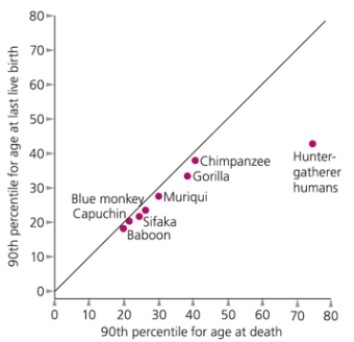Exam 12: After Conception: the Evolution of Life History and Parental Care
What does the following figure on primate longevity and fertility reveal? 
D
Imagine that you collect data from many different species that vary in their rate of extrinsic mortality. Based on predictions from evolutionary theory, draw an expected plot with extrinsic mortality on the x axis and rate of senescence on the y axis.
Based on predictions from evolutionary theory, we would expect to see a negative correlation between extrinsic mortality and the rate of senescence. This means that species with higher extrinsic mortality rates would also exhibit a higher rate of senescence, while species with lower extrinsic mortality rates would exhibit a lower rate of senescence.
Therefore, the expected plot would show extrinsic mortality on the x-axis and rate of senescence on the y-axis. The plot would likely show a downward sloping line, indicating the negative correlation between these two variables. This is consistent with the idea that species with higher extrinsic mortality rates would invest more in early reproduction and less in longevity, leading to a faster rate of senescence. Conversely, species with lower extrinsic mortality rates would invest more in longevity, leading to a slower rate of senescence.
In laboratory experiments, short-lived nematodes outcompete long-lived nematodes. This provides evidence that
The ideal organism would be reproductively mature at birth, have high fecundity, reproduce continually, and live forever. Please explain why such an organism does not exist.
What did surgical removal of ovaries in brown anolis lizards demonstrate?
What evidence suggests that male pipefishes adjust the amount of their investment in offspring depending on the size of the female?
You are studying sex ratios in Seychelles warblers. A drought results in very low resources. Explain how this is likely to affect the population sex ratio and why it would benefit the female to adjust the sex ratio this way.
You discover a new gene expressed in the placenta. You find that this gene is responsible for diverting more nutrients to the developing fetus. Based on the conflict hypothesis for imprinting, it is most likely that
Tasmanian devils are experiencing a massive population crash due, in part, to the emergence of a contagious cancer called devil facial tumor disease. The disease has significantly altered the age structure of populations, with far fewer older individuals in populations affected by the disease. Prior to the disease, devils typically reproduced seasonally starting in their second year. What effect would this change likely have on reproductive schedules in devil populations?
In species where there is an unbiased operational sex ratio, you would most likely see
Which of the following is/are part of the life history of an organism?
Which of the following support(s) the hypothesis that miscarriages may be favored by natural selection for embryos that are unlikely to survive?
Evidence suggests that male pipefishes may be able to adjust investment in offspring depending on the size of the female. How would the probability of remating influence the optimal investment strategy by males?
The evolutionary conflict of interest between siblings competing for parental care is
Researchers have demonstrated that the maximum life span of Drosophila melanogaster can be increased dramatically through artificial selection. This clearly demonstrates that genetic variation for increased longevity exists in
D. melanogaster populations. Why have flies likely not evolved longer life spans?
You discover a new imprinted gene in the placenta. The father's copy of the gene is turned on, and the mother's copy is turned off. Describe a process for determining what effect this gene has on the developing fetus.
Filters
- Essay(0)
- Multiple Choice(0)
- Short Answer(0)
- True False(0)
- Matching(0)